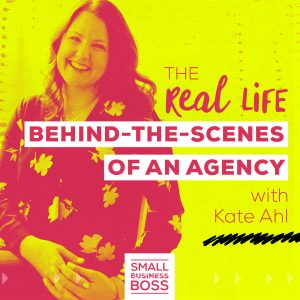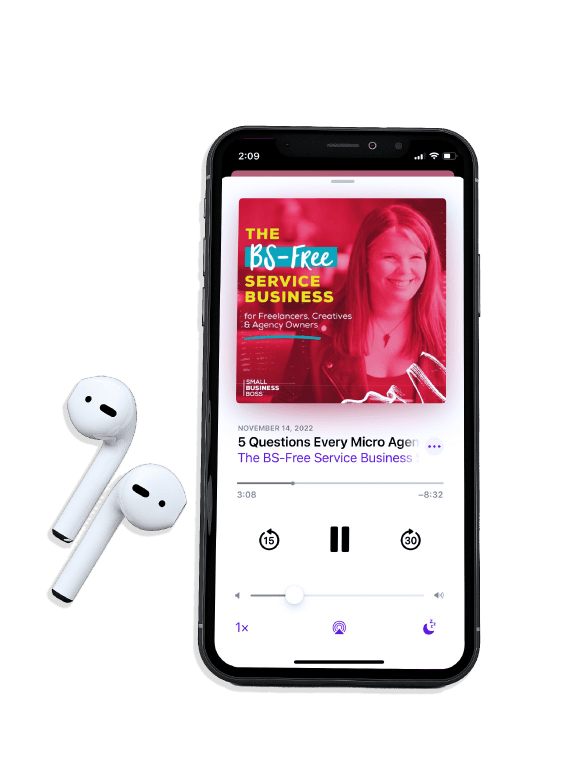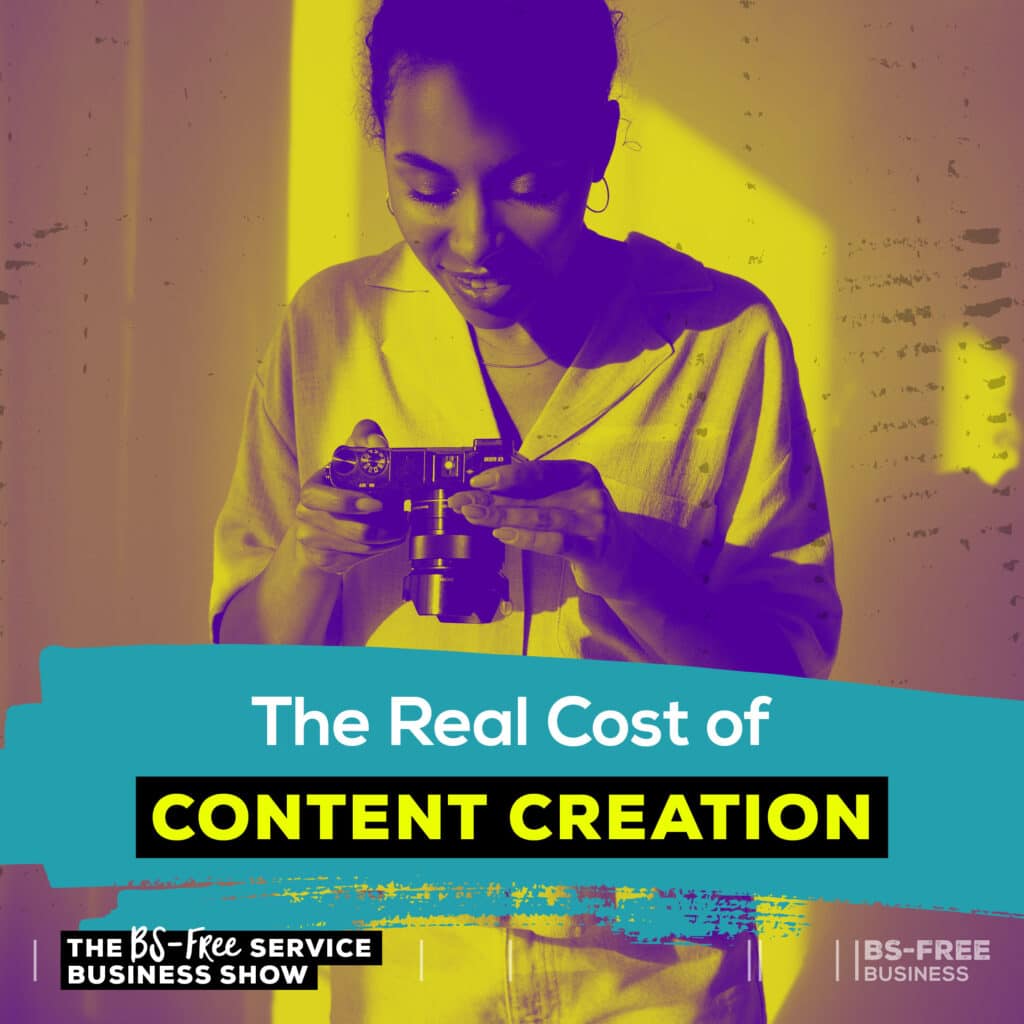
Search the site:
The Real Cost of Content Creation
Can you afford to ignore the power of content creation for your service business? And are you holding your business back if you don’t blog, podcast, and post on social media? Or are you wasting your precious time and money?
Today, I’m diving headfirst into the real cost of content creation. I’m peeling back the layers of time and money it takes to create Insta-worthy posts and buzz-worthy blogs. Buckle up and get ready to uncover the truth behind the price tag of online visibility and answer whether it’s really worth it for your service business.
While there are many ways to market your service business, content creation including blogs, podcasts, social media, and email marketing offers a proven way to reach potential new clients.
Whether or not you pursue content creation as part of your overall marketing plan will vary based on your industry, target audience, and more.
I wanted to do this episode, as one of the biggest frustrations I hear from service business owners about content marketing is that it’s resource-intensive.
Before discussing the real cost of content creation in detail, I want to be clear that not every service business owner needs to create content. I have many clients who have thriving businesses who don’t rely on this type of marketing.
The other reminder about content creation is that as a service business owner, that’s your primary job. You’re a creative consultant or coach, not a creator or influencer.
That’s why you need to be careful not to compare your content creation efforts as someone marketing your services with someone who monetizes their content through brand deals, affiliate marketing, online courses, products, ad-revenue shares, user-generated content, and creator funds.
You may create content, but you’re not a creator.
Even as a podcaster and blogger with over a decade of experience, I’ve always created content to support my business, not monetize it via brand deals or ads.
If you’re already creating content of any kind for your business, or you’re considering adding it as a potential marketing channel, you’ll want to stick around for this deep dive into the real costs of content creation.
The Value of Content Marketing for a Service Business
Content marketing is hardly anything new, it’s been done in some form for centuries. With the rise of digital media in the 90s and into the 2000s, content marketing emerged as a way to reach customers using these new platforms effectively.
I remember the first time I ever heard of a blog I was sitting at my desk at my PR agency job in the early 2000s, and someone suggested we pitch a blogger. Fast forward a couple of years later and more of my clients wanted to start doing content marketing, and as a strong writer who knew how to tell a story, I was the natural person to take the lead on blogging.
The biggest reason my clients were willing to invest money in this new approach to marketing is that it would enable them to create brand awareness while establishing their expertise without having a reporter or other gatekeeper between them and potential clients.
We’ve all had the experience of wanting to buy something, and do a Google search and blog posts to research it further. Or discovering something new on social media or getting an email about a sale from a brand we love.
Our clients are no different, especially if you’re targeting entrepreneurs and small business owners. Creating content lets you connect with and educate potential clients, build relationships, and generate leads.
Compared with many other marketing approaches, creating content is considered “cost-effective.” However, as a service business owner, you need to remember that most of the marketing you do is relatively low to no cost as you’re not typically investing in traditional advertising
But what are the costs you should consider when creating content as part of building your brand, establishing expertise, and building trust with potential clients?
Exploring Different Content Marketing Approaches
It’s important to note that for service business owners, content isn’t one-size-fits-all. For the purposes of this discussion, I’m going to focus on two main approaches, which are the most common ones used by my clients
Single Platform Approach
Many of my clients have a limited need for content marketing, so they focus on a single platform. Some of them blog for SEO and others post on a single social media platform such as LinkedIn or Instagram.
Multi-Platform Approach
With this approach, typically, hero content such as a blog, podcast, or video is created, and then that’s used on other places such as social media or email. Multi-platform content marketing tends to be favored by people whose clients are other entrepreneurs (or small businesses) vs. corporate clients.
Regardless of which approach you choose, there are time, money, and other resources involved that need to be considered.
Investing Time in Content Creation
One of the biggest factors when deciding to create any type of content is how much time it’ll take. As a service business owner, you often don’t have much time to commit to marketing activities, so you’ll want to consider if content creation is right for you.
As someone who has a multi-platform approach for BS-Free Business and runs a content production agency, I’ve got years of experience with creating content. Each type of content requires different skills, so you need to assess what skills you currently have, and where you may need to commit time to develop them.
For example, if you’re a strong writer but new to writing blogs, you’ll want to learn how to structure your content, select and use keywords, select topics your readers will benefit from, and so on. (This is also why you should play to your strengths when picking what type of content is best for you.)
What about the actual minutes and hours you’ll need to create different types of content? This is a nuanced topic as it’s reliant on skills, how complex the topic is, what research is required, and so forth.
Here’s a quick rundown on how long different types of content take me to create, keeping in mind that I create content nearly daily. Content production is my literal business.
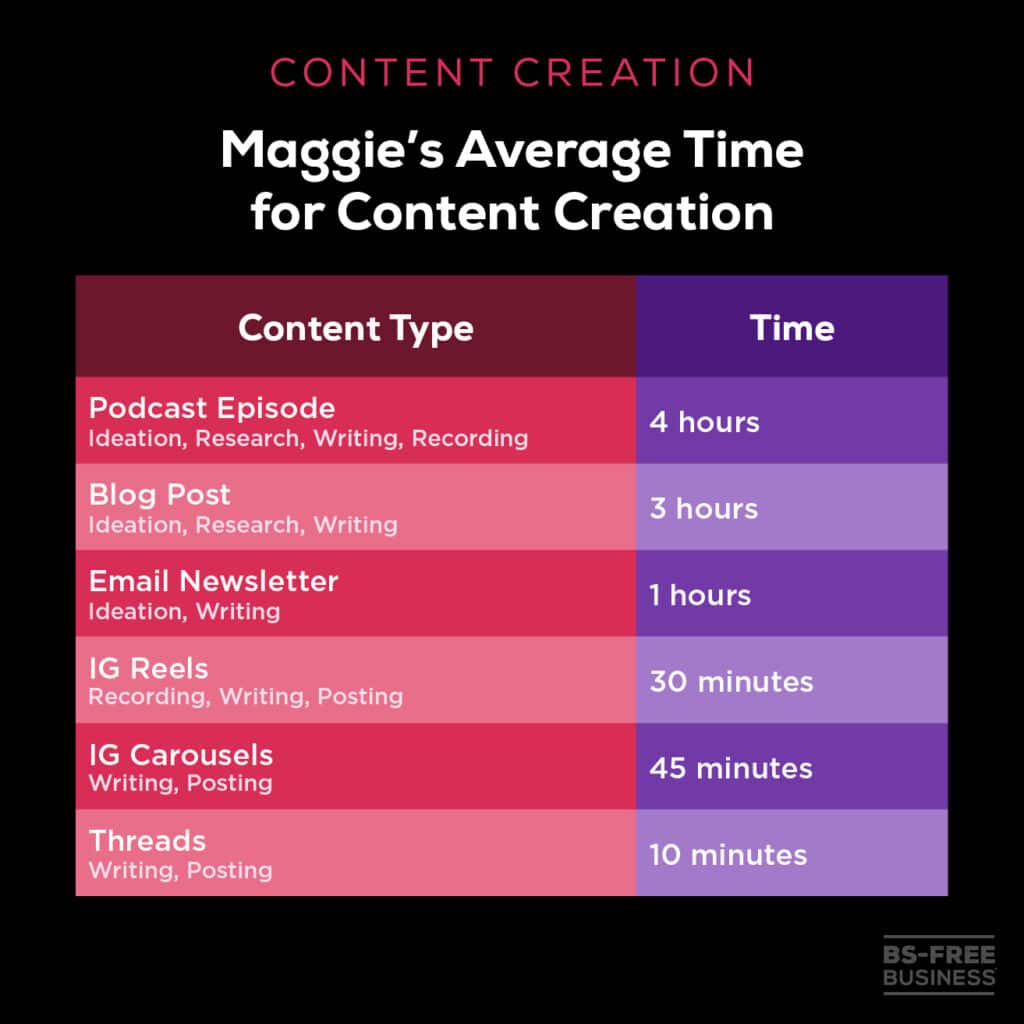
It’s important to note, that for the podcast and blogs, once they’re created they leave my hands to go to editing and are set up by my communications coordinator on the website and our podcast host, so this is just the creation time.
As a result, these time estimates are likely higher for many of you, especially if you’re doing the entire process on your own. I asked Chat-GPT for time estimates for the average person and here’s what it said:
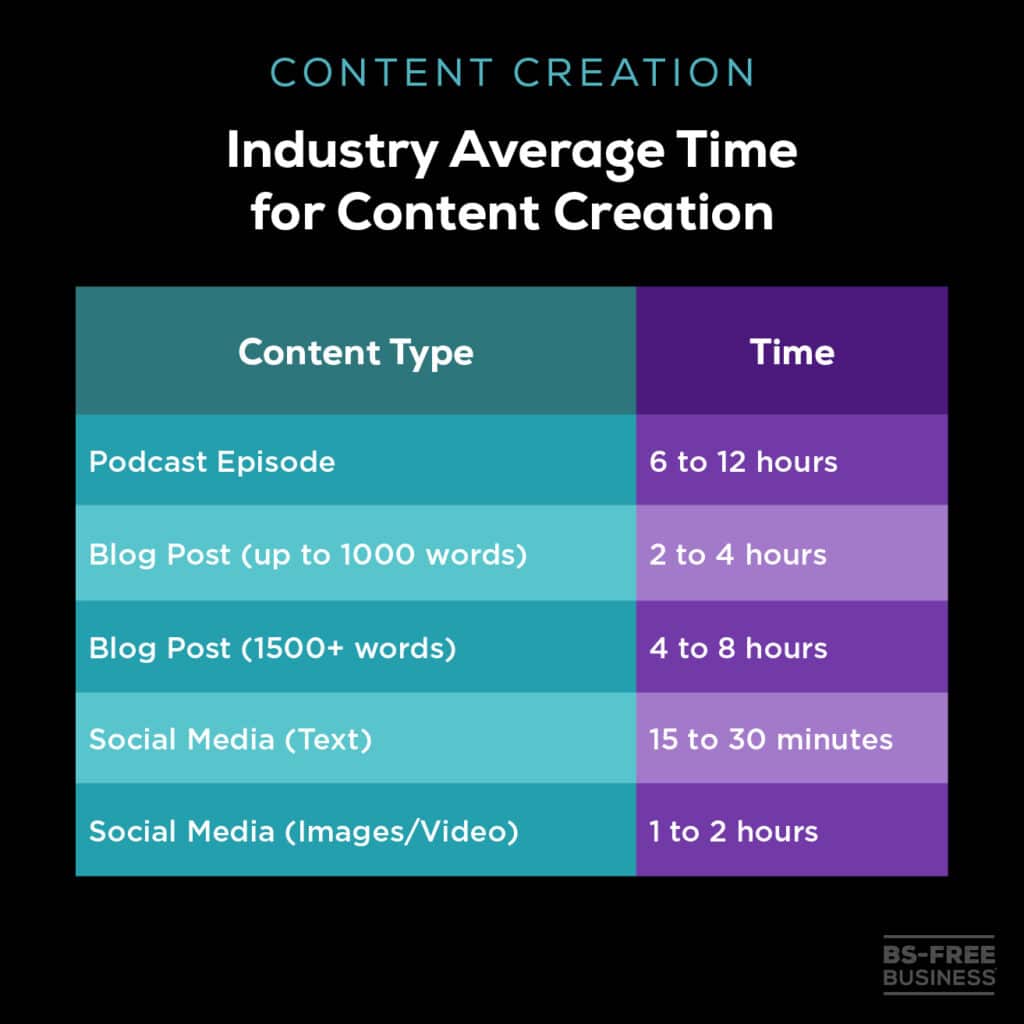
A study from Orbit Media reported that the average blog post takes 4 hours and 10 minutes to write, and that doesn’t include images, formatting, SEO or other elements required for blogging. Interestingly, a third of the bloggers who spent more than six hours on a post reported “strong results”.
The point here is not to get fixated on the exact amount of time, but rather to recognize that to create the kind of quality content that gets results for your service business requires a time commitment.
The time you dedicate to content creation is an investment, and it may take a while to pay off. Like so many things we do in business, you need to ensure you have a solid strategy so you’re being seen where your potential clients will be looking for you.
Content creation is a long-term marketing strategy for your business, so if you’re looking for quick marketing results, this isn’t the way to go.
Honestly, I’m now in year ten of podcasting, and every single year I think “I’m finally hitting my stride!” only to realize I’ve been saying it every year.
Think of content creation and building the know, like, and trust factor with potential clients as an investment you make that compounds over time. It’s the consistent action of creating content that creates cumulative results.
The Financial Cost of Content Creation
Maybe you’re ready to create content for your business, or you’re looking to step up what you’re already doing. In addition to the time spent creating content, there are going to be explicit hard costs.
Determining the financial investment required for content creation is definitely complicated. Here are three main considerations.
DIY vs. Outsourcing
First, it’s going to depend on how much of the content creation you want to do yourself. Are you equipped to do everything from start to finish? Or do you need help with aspects of the process?
Case in point: I’ve outsourced podcast editing from day one. I knew if it was up to me to edit my own show, it’d never get out the door. That’s been a hard cost of having a podcast for the last decade. On average I spend between $250 to $500 per month on podcast editing.
Maybe you want a VA to set up your posts or emails, someone to write social media, or a designer to make it all look good.
For this podcast, there are five of us involved in getting it out the door. In addition to my editor RJ, Jessica from Perrenial Creative handles the design of all graphics, and then Sara and Ella on my team manage audio production, show notes, the RSS feed, setting up on the blog, and so on.
My team’s costs for a podcast episode range from $300 to $400. In 2023, we produced 30 episodes, bringing team costs for this show to between $9000 and $12,000 for the year.
That’s not to say you need to invest that money, but I did promise real talk in this series, so I wanted to share my numbers.
Could you do all of that yourself to save money? Yes, but it’ll cost you the time to do all of those things. This absolutely depends on where you are in your business and what’s more important to you, time or money.
Tools For Content Creation
Next, you want to think about what tools you need for your content creation. These costs will vary dramatically based on what type of content you create and how many bells and whistles you need.
Currently, I have a handful of tools that are specific to content creation, so the overall cost is relatively low. (I tried to exclude tools or tech that we’d have even without content creation, like our website.)
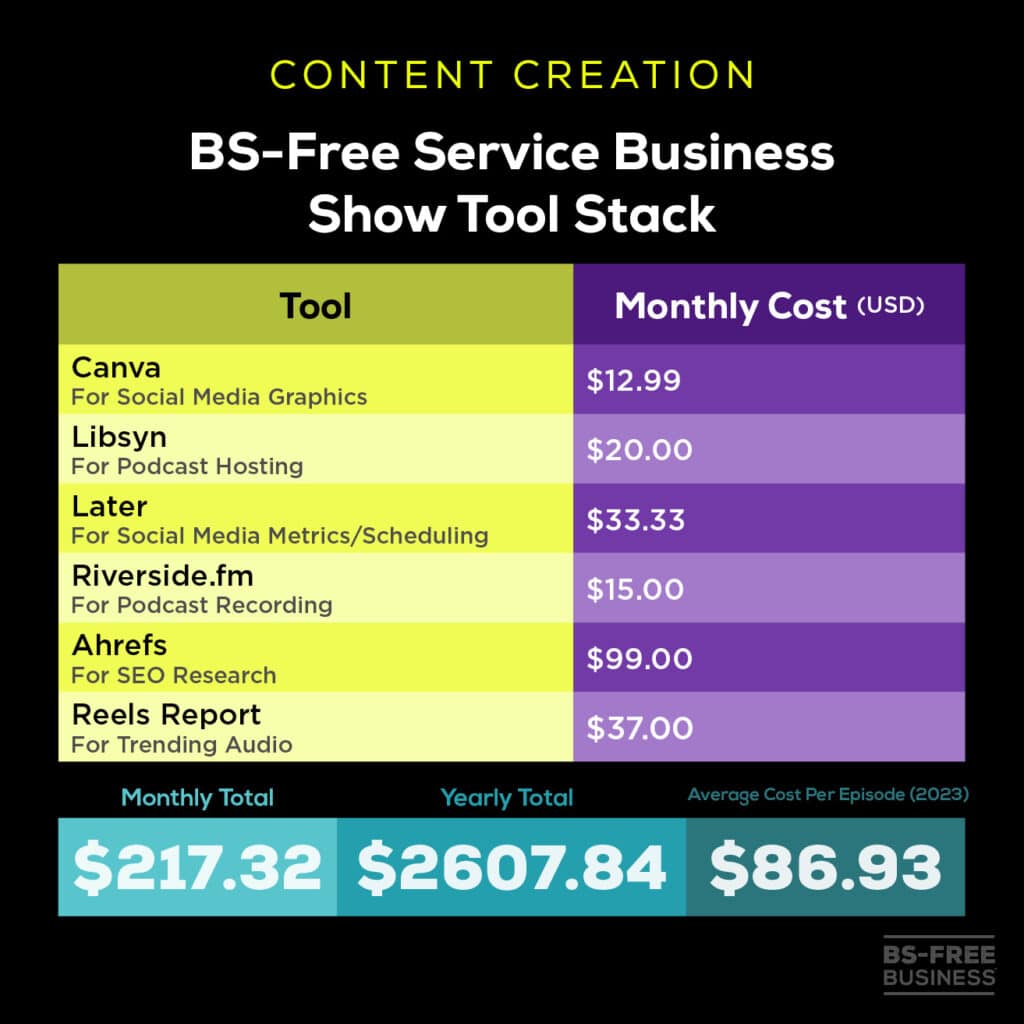
In case you’re not keeping track, between team costs and tools, my average podcast episode costs are as follows:
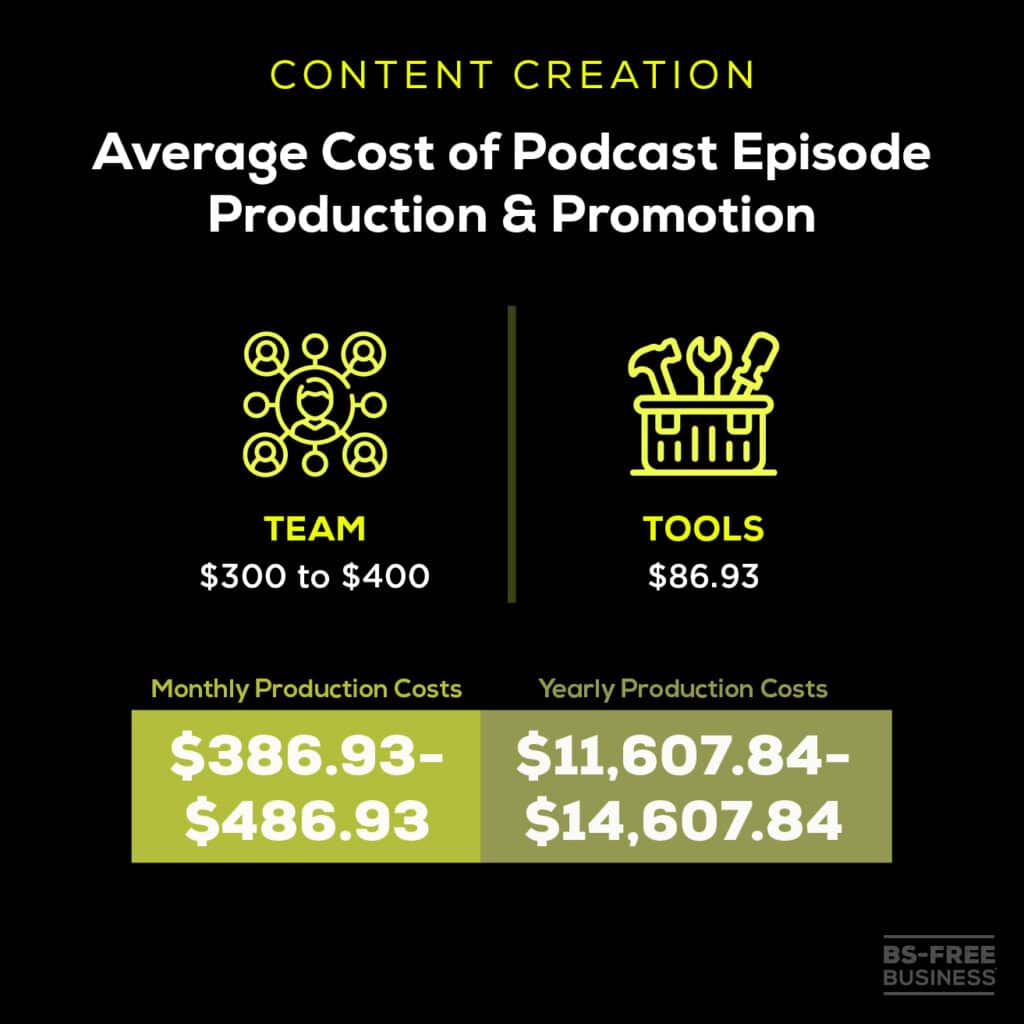
Skills and Training
The content world changes rapidly. If you’re just starting out with content, you’ll likely need to develop your skills, and over time, you’ll need to add to your skills as platforms and tactics evolve.
Even as someone who works on content creation daily for myself for for clients, I always need to fine-tune or update my skills. If you’re engaged in a single platform strategy, you likely can maintain your skills with less need for a financial investment. If you’re using a multi-platform approach or experimenting with different types of content, you’ll likely need to develop skills on an ongoing basis.
For 2024, I’ve signed up for Jeremy Enns’ Podcast Marketing Academy as part of my commitment to growing this show this year. I’m by no means an expert on podcast marketing as this isn’t something I do in my agency, so I wanted outside help and that required an investment of $2500 for the year.
By this point, you may be wondering, but Maggie, is this really worth it? Should I even bother, as these costs are adding up?
Measuring the ROI of Your Content Creation
Remember how right out of the gate I talked about how, as a service business owner, you’re not a creator? Your content’s job is to help you bring new clients in the door.
When it comes to measuring the ROI of your efforts, there’s only one thing that really matters. Did you get clients from this type of marketing?
I often chat with my clients, and they’ll confess that they hate doing a certain type of marketing, and I always ask if they actually get clients from it.
If the answer is no, there’s only been one client in years, which tells me they’re not getting the ROI to justify the time or money involved.
You can measure all the click-throughs, downloads, and likes that you want, but if it’s not converting to clients, you’re left with a decision.
It’s time to decide if you stick with it and commit to doing it differently so you can get results or ditch it completely. It’s really important that discern the difference between your strategy not being quite right and cling to a platform or type of content because maybe one day it will finally work.
That’s a little something called the sunk cost fallacy, and you need to know when to cut your losses.
If you’re wondering if all the content creation I’m doing right now delivers ROI, the answer is yes.
The majority of people who sign up for one of our masterminds or communities have listened to this podcast. Sometimes, they find us on Instagram and then end up listening to the show (or reading the posts). Other times, they find me via podcast apps or another podcast I’ve guest-starred on.
To prepare for this episode, I actually asked my community the question, “how did you find Maggie and BS-Free Business?”
Here’s how it broke down:
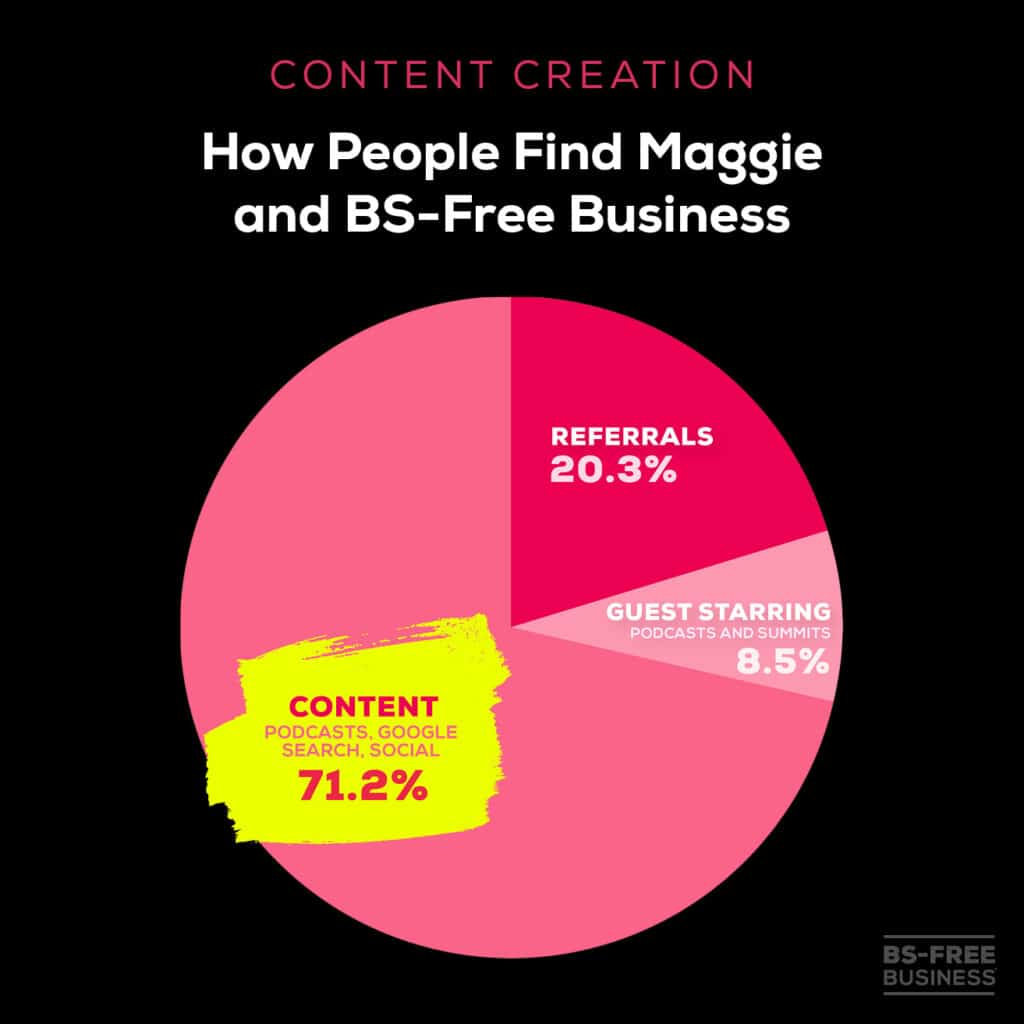
Not all of the people are paying clients, but if you look at where my clients come from for the agency, the results are flipped. Right now new client leads are 70% referrals and existing connections, with Google Search and LinkedIn content making up the remaining 30%. This highlights the difference between a service business that works with corporate clients and doesn’t rely on content marketing and one that does.
Also, I want to be very clear that you shouldn’t compare your results with content creation with mine. I’ve been creating content for this business and its predecessors since 2013, so I’ve had years to build up to this point. (As it’s my goal to continue to grow my reach with BS-Free Business for this year, so be sure to share this episode with a friend!)
Aligning Your Content with Your Business Goals
As we wrap up today’s episode, I want to remind you that the primary goal of your content is to attract new clients and grow your business. You need to carefully consider what approach, content types, and platforms are best suited to both you and your potential clients.
If you’re currently creating content and aren’t getting ROI, don’t hesitate to switch things up. While content is a long game, the costs of creating it mean you don’t want to waste your time on anything that’s not moving the needle.
If you’re trying to decide if you should engage in content creation for your business, keep in mind that you can start small and experiment over time. You can pick a single type of content and go from there. Remember, just because something works for a big name celebrity entrepreneur who’s been in the game for 10+ years, it doesn’t mean it’s the right move for you.
The cost of content creation is very real including the time, money, energy, and everything else that goes with it, so you get to decide if it’s the best marketing move for you.
Note: This post includes affiliate links, we receive a small commission if you decide to purchase any of them.
Links for this episode:
- Your Guide to Marketing a Service-Based Business
- How to Get Paid and Make Money as a Content Creator
- What You Need to Know About LinkedIn for 2023 with Andréa Jones
- 2023 Blogging Statistics: 10 years of Trends and Insights from 1000+ Bloggers
- Perrenial Creative
- Riverside.fm
- Reels Report
- Podcast Marketing Academy
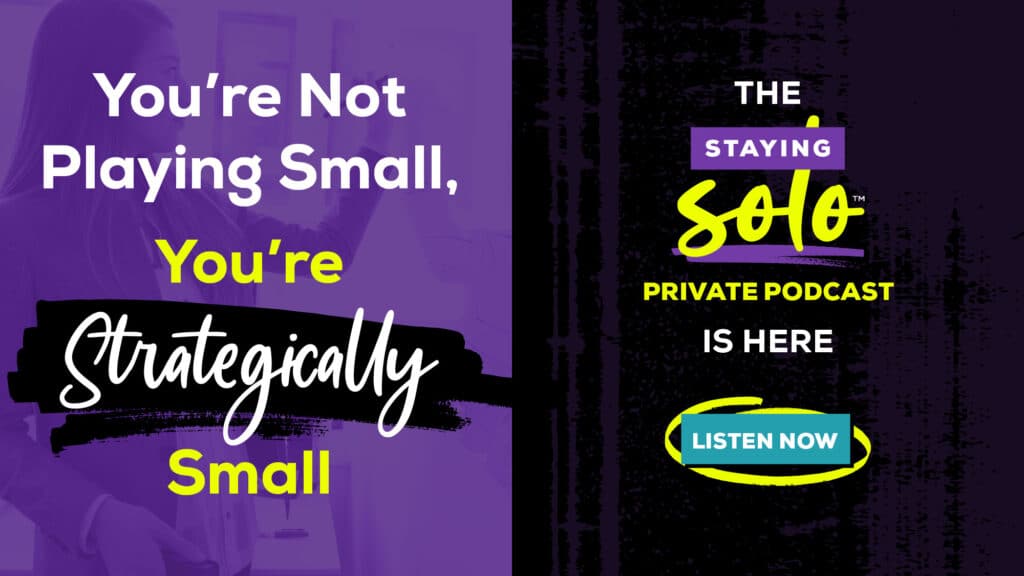

I’m Maggie Patterson (she/her), and services businesses are my business.
I have 20+ years of experience with client services, am a consultant for agency owners, creatives, and consultants, and vocal advocate for humane business practices rooted in empathy, respect, and trust.
Help Not Hype
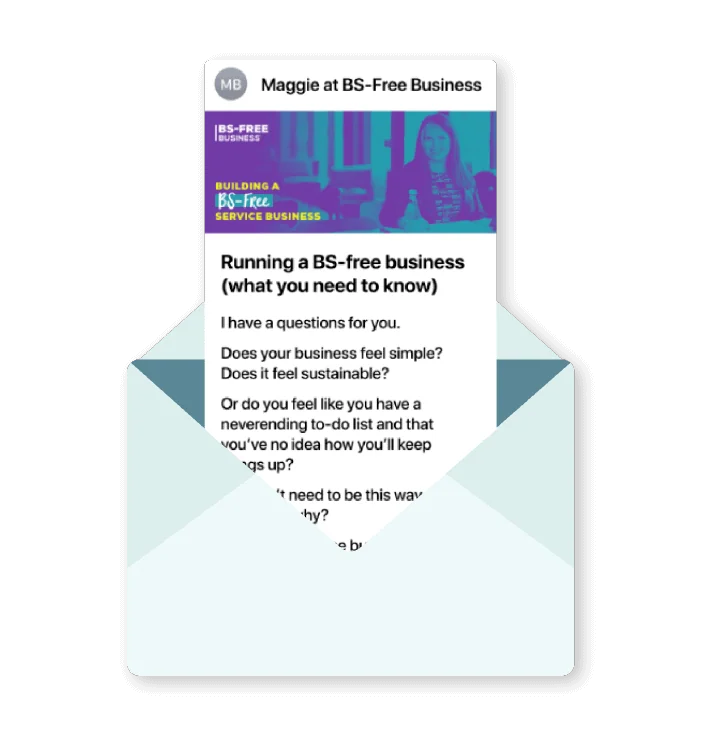
Tired of the same old BS business advice?
I got you with weekly emails packed full of proven strategy that makes a real difference in your service business.



